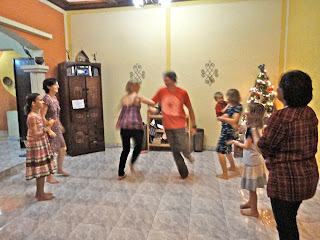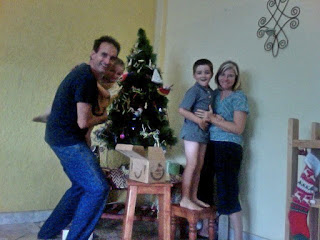I am realizing that this is going to be the last post of 2011. I am also realizing that if I do not get it up tonight I won't even be posting this in 2011 as we are preparing this evening to go on a one week vacation to a mission house in Kigoma, Tanzania. It is supposed to be a very reclusive cabin by the beach that is fairly rustic (no electricity and no internet). So I am going to put up a concise story of the week's events as it is getting late and there is much to do.
I will say that much of the week seemed to be dedicated to Christmas related activities. The kids did have school Monday through Wednesday, Oren did karate on Tuesday and then he and I went out Christmas shopping for some sidewalk chalk for David. (That is his favorite thing ever these days, he has used up about 3 boxes.)
Wednesday I taught my last ballet class and while we did work Thursday as well, we split the day since the kids were out of school. Friday was given over to preparing for our Christmas contradance party. I think these bimonthly parties are essential to get Rebecca and I to clean and reorganize the house. Particularly to get all the stuff that accumulates on surfaces back to its proper places.
Jodi was with us for part of the week but headed for a retreat upcountry on Thursday, but Yolanda arrived into town so we had her as a guest for Friday and part of Saturday.
The Christmas party was one of our best to date. We cleared out the living room once again and prepared several dances for the group to do. We had a very large number of people, most of them missionary friends, but among the newcomers was Oren's teacher from last year Mme. Crystelle and her daughter Pauline (4th grader). There were alot of kids and it was a good mix of francophones and anglophones so no one felt left out. Pauline really liked the dancing and she asked us to repeat "Cotton-Eyed Joe" about 4 more times at the end of the evening.
We ended the main set of dances before dinner with the Virginia Reel (Strip the Willow). But I must add that through most of that time we had one of the worst downpours I have ever seen here. Our backyard had about a foot of water in it and the rain pounding on the roof competed with the sound of the music indoors. A few people, who hoped to come late, were actually prevented from getting to us by the rain. Fortunately we stayed relatively dry indoors although some of the guests did have to help us bail and squeegee off the porch a few times.
Dinner was a potluck and the offerings were exquisite, featuring dishes as far-ranging as Mexican and Indian. After dinner we did a bit more dancing and finished by singing Silent Night together in the languages of all represented there. English, French, Danish, Dutch, Kirundi.
When the 45 or so guests left, Rebecca and I took several hours to clean the house up that night and got to bed close to midnight. But it was good to leave the house in good order.
David and Oren woke up at the crack of dawn as usual. They were excited that Saturday was going to be a day for the family at home. We had planned to follow in the tradition of Rebecca's family and do baking on Chistmas Eve day. The project that Oren was really looking forward to was a gingerbread house. We try to do one every year and we have been able to have someone bring out a kit just before Christmas to help us make it.
This year however, no one was coming at the right time so we did not have any pre-cut gingerbread pieces and ready-made icing and selection of decorative candies. So we had to 'kick it old school' Burundian style. We were able to get the ingredients for gingerbread easily enough, but Christmas candies such as candy-canes, or any peppermint for that matter, does not seem to exist here. I ended up buying several rolls of fruity menthos that were more pastel-ly than I would have liked. I found some green candies that were spearmint and looked like gum drops. Oren made little bushes around the house with them. Unfortunately I think they were either breath mints or something for smokers to help them quit smoking because they tasted terrible, like a super strong cough drop. But they did look nice.
 I made the royal icing with powered sugar Rebecca bought in the Asian Quarter. It is necessary for mortaring and decorating the house with snow. We also had some other icing that was green and red.
I made the royal icing with powered sugar Rebecca bought in the Asian Quarter. It is necessary for mortaring and decorating the house with snow. We also had some other icing that was green and red.Oren and I started work on the house by cutting a pattern while Rebecca made the gingerbread dough. We cut out pieces on wax paper and cooked it right on the wax paper. The gingerbread came out fine although it took 3 cookie sheets to cook all of the pieces.
We assembled it with the icing and it held together well. I tribute this partially to my ingenious idea of using 2 craft sticks as rafters so the roof could rest on something while the icing was drying. When it was fairly hard we decorated it. Actually Oren did pretty much all of the decorating. It was a very good job in my opinion. We finished by noon. We had a great sense of accomplishment.
Rebecca continued making several other kinds of cookies to take to a party we were going to on Christmas day. Since we had no staff on Saturday, the clean up was enormous. We don't have a dishwasher and we had about 3 loads of dishes to do after this was all done. (Rebecca did them. but I did the same amount today, Monday).
 The kids were ready for bed fairly early Christmas eve, but we let them open one toy that evening. We also skyped both of our families and had some great video conversations as the network was working great that night. This is the first time in many, many, years that I have not been at a Christmas Eve service. But since Christmas was on a Sunday, our church was not having one.
The kids were ready for bed fairly early Christmas eve, but we let them open one toy that evening. We also skyped both of our families and had some great video conversations as the network was working great that night. This is the first time in many, many, years that I have not been at a Christmas Eve service. But since Christmas was on a Sunday, our church was not having one. This makes some sense here as Christmas day is seen as a big Holiday and would be the more important time of worship rather than Christmas Eve (as we see it in the West.) In fact, Christmas is seen as a day to try to schedule special celebrations. There were an enormous amount of Christenings, Baptisms, and Weddings this past weekend. (I can imagine this is a hard day for pastors, especially because all Protestant Baptisms in Burundi are total immersion in Lake Tanganyika and nothing else is acceptable.)
It is a striking contrast to my own sense of Christmas day, which tends to be more of a private family time. Here it is really a festival day and we even had a Birthday cake and juice at church after the service on Sunday while the children played games together. (Rebecca brought the parachute for her Sunday School class.)
The kids were very excited and woke us up about 5:45. We were going to wait to open gifts after church, but they could not wait. Oren exclaimed many times "Look at all the Presents!" What was pleasing to me was to see that he was referring to a stack of about a dozen small gifts for all four of us. It really looked quite modest compared to what I remember in my childhood. But he saw it as quite a lot.
Among the favorite things were 2 remote control cars I bought at the Chinese version of K-mart (T-2000) for about $10 each. They worked fairly well until Noel our younger dog caught David's and chewed off a wheel. (By the way, it was Noel's Birthday --1 year on Christmas.) She is now much bigger than her mother --Bella.
Sunday afternoon, after church, we went to yet another party. This one at our friend's Astrid and Travis. They have recently moved into a house vacated by our friends Thomas and Naja. It is a great house and we saw many of the people that had been at our party as well as friends from church.
Travis and Astrid had made up several very fun games for kids and adults to play. The best was probably one where you had to try and get dressed on the trampoline while someone was bouncing you around.
We had another pot luck then a White-Elephant gift exchange. It was one of the more unusual ones I have been to as someone had snuck in some currency into some of the gifts, there was a $100 and a $50 bill. (The kids really went for the money which was kind of funny.) I think a little girl ended up with the $100.
We left late in the evening and fell into bed. I can't believe I am up late again but we have to get packing as we want to leave by 8am for our vacation in Tanzania. I think we are almost done though which is good since I am falling asleep at the computer. (sorry no proof reading)







































